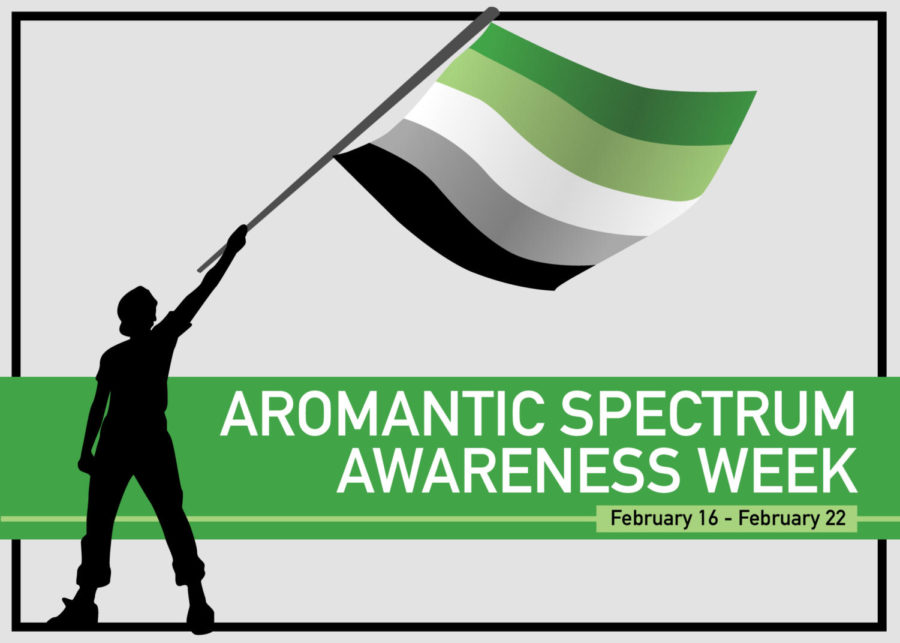Visibility brought through Aromantic Spectrum Awareness Week
February 16, 2020
One week in February is set aside to bring awareness and visibility to one group within the LGBTQIA+ community, the aromantic spectrum.
Starting on Feb. 17, Aromantic Spectrum Awareness Week (ASAW) kicks off an entire week of visibility.
AUREA is an organization that brings awareness to the aromantic spectrum and are a part of the awareness by trying to make aromantic spectrum voices and issues heard. Awareness and education are the major goals of the week.
This organization has an informational website as well as a blog where it hosts AUREA decisions and awareness on Tumblr along with the rest of the aromantic spectrum community on Tumblr. AUREA encourages those who are a part of the aromantic spectrum to contact their local LGBTQIA+/GSA groups and let them know about this blog space, to circulate the news offline and organize events for AUREA offline.
Aromanticism.org, otherwise known as AUREA, described Aromanticism as “a sexuality within the LGBTQIA+ community in which someone doesn’t experience romantic attraction. Aromanticism can often be confused for asexuality, however, they are very different.”
The aromantic spectrum is a spectrum of not experiencing or having romantic attraction, while asexuality is a spectrum of not feeling or having sexual attraction, said Trinity Dearborn, senior in women’s and gender studies, president of the Pride Alliance and president of the Asexual Aromantic Alliance.
The purpose of Aromantic Spectrum Awareness Week is to spread awareness and education about aromanticism and aromantic issues such as amatonormativity, which is the idea that a central, exclusive, amorous relationship is normal for humans, according to Elizabeth Brake’s website.
The week is also set up to help people who may be on the spectrum and not know it, so that they can stay informed and explore their sexuality and know they aren’t alone in this.
nicci port, program coordinator for Vice President for Diversity and Inclusion, serves as the project director for Diversity and Inclusion and LGBTQ+ initiatives. port said she agrees visibility and celebration is important for Aromantic Spectrum Awareness Week.
“Visibility is important for communities that are made invisible and the aromantic community is an example of that,” port said. “When populations are celebrated, the attention given can serve as support for individuals who identify with the community, can provide those individuals with connection to others in their community, and can educate allies and motivate accomplices to do more to support their asexual and aromantic friends and family outside of the given awareness week.”
During this week Dearborn and port also said they wanted to identify that there is a stigma and erasure in the community regarding aromantic and asexual identities.
port said there is erasure everywhere. She said the idea of romance and romantic attraction is the standard that is sold to everyone at every stage in people’s lives.
She also said companies like Disney sell romanticism to children, that holidays are built around romantic attraction and celebrated in schools, that marriages are built from it and that even the jewelry industry thrives on it.
port said the idea of romance and romantic attraction is consumed by society in ways that incapacitate society’s ability to fathom anything else. So ultimately when that happens, there’s no room left to comprehend aromanticism.
“This stems from people not knowing what these sexualities are and that romantic attraction is so naturalized that many don’t think it is possible to not experience romantic attraction,” Dearborn said.
Dearborn said there is a huge stigma in the LGBTQIA+ community with not seeing asexual and aromantic identities as queer identities and some people think those who have the identities don’t belong in the community at all.
In order to combat this stigma, especially during this awareness week, Dearborn said people should be educating themselves in order to help; just looking up aromantic online and finding resources or personal accounts about it will help.
They said those who aren’t a part of the aromantic spectrum should be accepting of aromantic and asexual identities in queer spaces and treating them as if they belong there. Dearborn said talking about these identities with others, especially if someone is an ally, creates a space where others can recognize that aromantic and asexual identities are spectrums and not one set definition as well.
port said by creating conversation and using critical thinking will help with combating this stigma.
“Exercise perspective-taking and practice critical thinking,” port said. “When you see an example of romance, ask yourself, ‘For whom would this not apply?’ Asking those questions of yourself can become a habit if practiced intentionally. And once it becomes a habit, you’ll find yourself doing it in all areas of your life, which will ultimately make you a more impactful member of the ISU community.”
As for those who identify on the aromantic spectrum, there are various resources on campus. Dearborn recommends the Asexual Aromantic Alliance as a resource, which they are the president of. Dearborn said this student organization does mostly fun community-building events like board games, watching movies and making crafts.
Dearborn also said there are aromantic and asexual people on the Iowa State campus, so for those who feel like they are alone on this subject, they aren’t. Dearborn also recommends the Center for LGBTQIA+ Student Success as another good resource.
Dearborn also said they would like to let other people on campus who have an aromantic identity know they are willing to be a resource and that they enjoy collaborating with others to learn about new things.
“Educating is really important to me, as well as representation,” Dearborn said. “I think looking up different identities in the spectrum is a good step in understanding this community and creating better spaces. There is nothing wrong with people who are aromantic or asexual, and we should not be treated as if our identities will change once we ‘meet the right person.’”

















